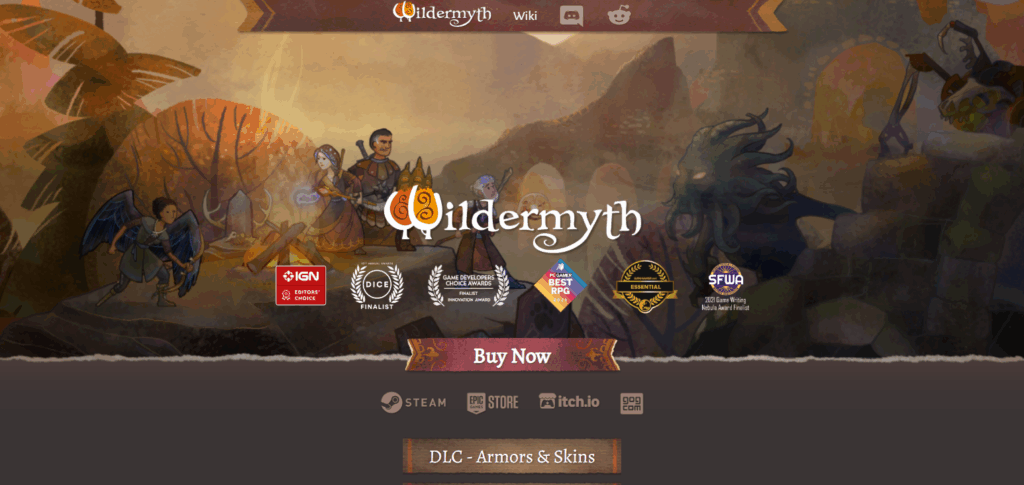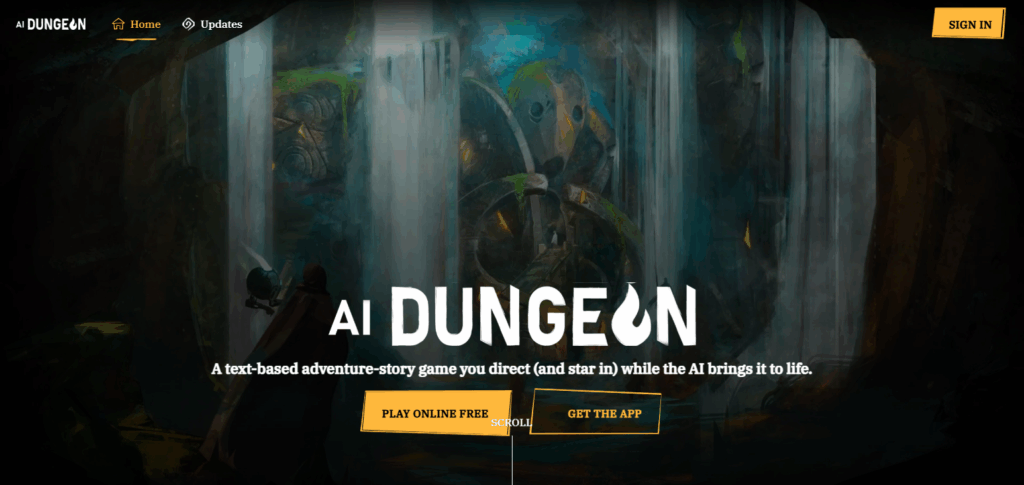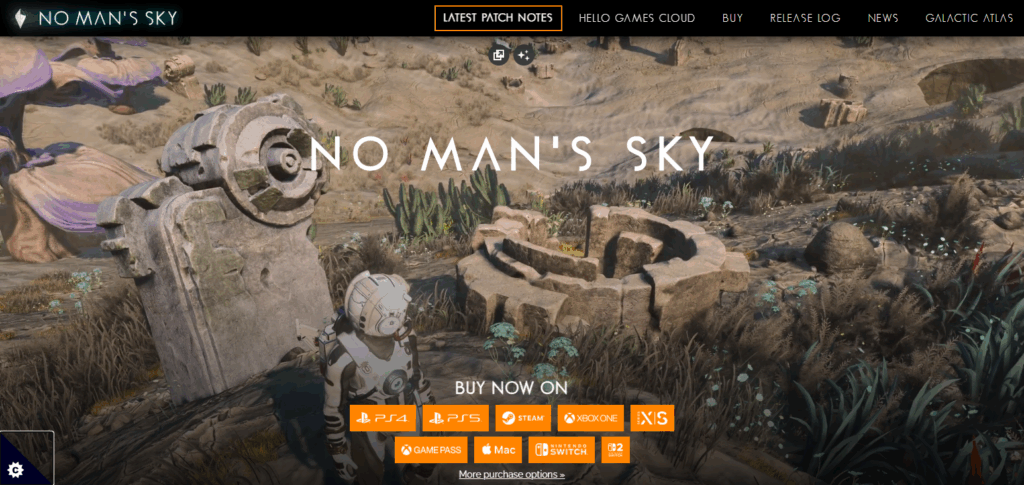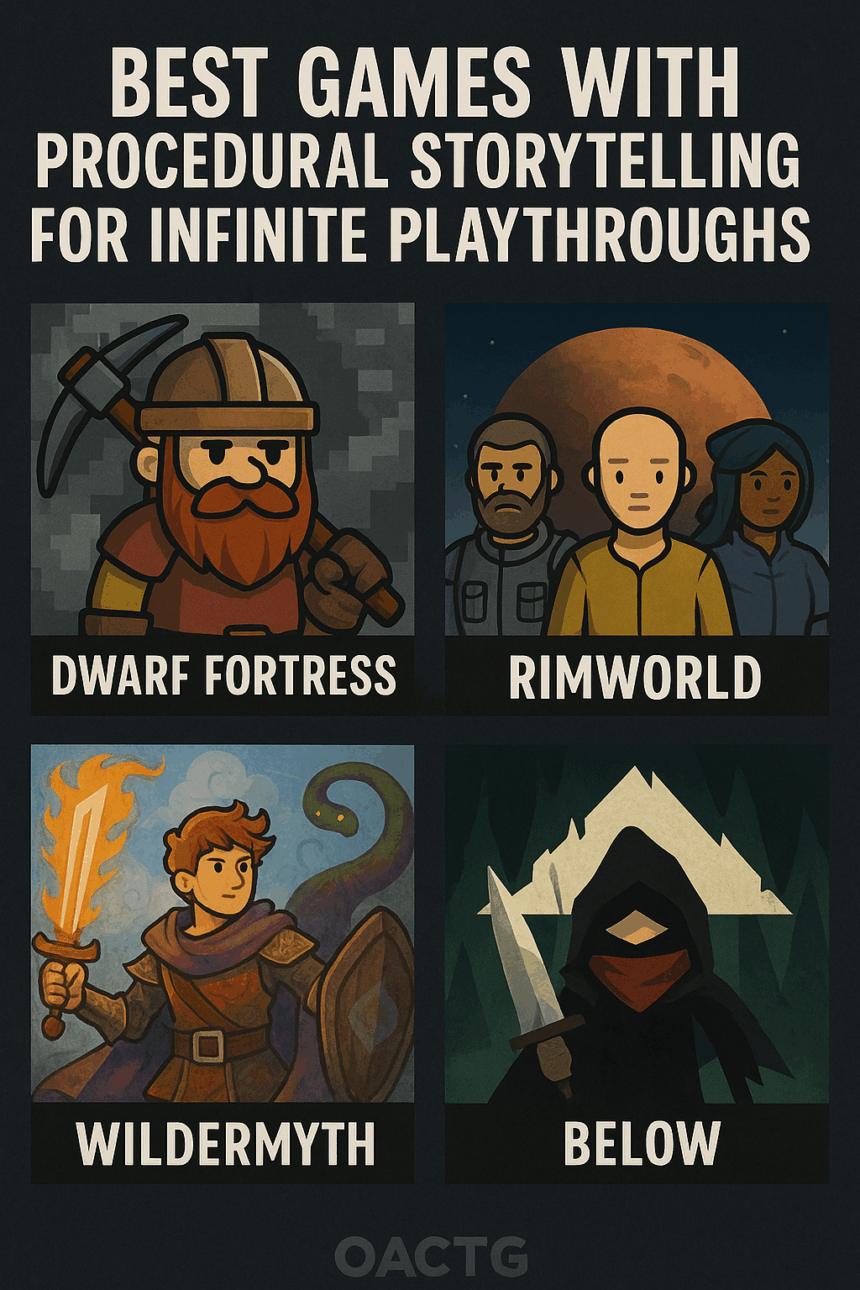I will explore the Best Games With Procedural Storytelling for Infinite Playthroughs focusing on games that feature ever-changing adventures based on dynamic systems and emergent narratives.
These games guarantee that every session is different, providing replay value for players wanting new experiences.
From tactical RPGs to open-world explorers, the procedurally told stories shift the nature of gameplay into boundless self-tailored odysseys.
Key Point & Best Games With Procedural Storytelling for Infinite Playthroughs
| Game | Key Point |
|---|---|
| Wildermyth | Procedural storytelling with characters who age, develop relationships, and gain narrative-driven traits, making each campaign feel like a collaborative myth. |
| AI Dungeon | AI-generated interactive text adventures that adapt dynamically to player input, offering virtually limitless emergent story possibilities. |
| Middle-earth: Shadow of War | Expands the Nemesis System to build personalized rivalries and alliances within an evolving open-world Orc hierarchy. |
| Rogue AI Simulator | Puts the player in control of an evolving artificial intelligence, balancing growth, survival, and the consequences of emergent behavior. |
| Dwarf Fortress | Ultra-deep simulation of a dwarven settlement with complex systems (economy, geology, psychology) where emergent stories arise from systemic interactions. |
| No Man’s Sky | Massive procedurally generated universe with exploration, base-building, and ongoing live-service evolution since launch. |
| Hylics | Surrealistic RPG with claymation-style visuals and abstract logic, prioritizing mood and aesthetic over conventional gameplay clarity. |
| The Elder Scrolls V: Skyrim | Open-world fantasy freedom, letting players shape their destiny through exploration, faction choices, and character builds. |
| Detroit: Become Human | Branching narrative focused on android sentience and moral ambiguity, where player decisions significantly alter story outcomes. |
| Spelunky 2 | Challenging roguelike platforming that rewards mastery of procedural level design and risk-reward decision-making. |
1. Wildermyth:
Wildermyth uniquely combines tactical combat with storytelling, especially with regards to tracking heroes from simple starts, through aging, relationships, and to legend status.
Its storytelling is procedural, intertwining dynamic and fixed attributes to create character-driven myths with emergent and community-driven polish as late as mid-2025, even when primary work stopped in 2024.

The team is still refining. Best Games With Procedural Storytelling for Infinite Playthroughs – is Wildermyth earns this phrase because the systems in place guarantee every campaign feels unique and hand-crafted, unlike fatigue-inducing algorithms. Instead, relationships, rivalries, and choices shaped in and out of combat ensured replayability.
1. Wildermyth
Pros:
- Dynamic Character Arcs: Unique character narratives are created such as romances, rivalries, and character transformations, boosting replayability and immersion.
- High Replayability: Unique playthroughs of the game are ensured through randomized campaigns, events, and character traits.
- Engaging Tactical RPG: Fans of narrative in addition to gameplay are attracted to this game as it blends procedural storytelling with strategic combat.
- Charming Art Style: The hand-drawn visuals that complement the emergent narratives are each distinct visually, enhancing the gameplay experience.
Cons:
- Niche Appeal: The incorporation of Tactical RPG mechanics may hinder some players, thus broadening the game’s best status.
- Learning Curve: Advanced systems such as legacy characters and campaign progression may prove daunting to new players.
- Limited Main Plot Variety: Campaign structures tend to follow similar beats, so while the overarching campaign is described as static the character arcs are described as procedural.
2. AI Dungeon:
AI Dungeon is a fully-developed narrative playground, leveraging AI’s capabilities, with Muse debuting in 2025—emotionally intelligent storyteller built on Mistral NeMo 12B—offering deeper, coherent character arcs and scenario persistence.

Building settings, characters, and themes is now seamless and the model adapts to user inputs in real time, offering boundless, community-driven, branching adventures with user-defined mechanics and shared templates.
Best Games With Procedural Storytelling for Infinite Playthroughs – Wildermyth connects conceptually because AI Dungeon’s generative backbone guarantees utter uniqueness, weaving user prompts into sprawling emergent sagas that defy repetition.
AI Dungeon
Pros:
- Near-Infinite Variety: Personalized storytelling delivers endless narrative possibilities through crafted player input.
- Flexible Gameplay: Maximized creativity as all genres and scenarios, whether in fantasy or sci-fi, are accessible to players.
- Accessible: Broader appeal as no advanced gaming skills are needed in text-based formats.
- Constant Updates: Storytelling quality AI technologies have and continue to improve regularly, with updates integrating them more seamlessly.
Cons:
- Inconsistent Quality: Smoother, cohesive, and more polished narratives are AI-advanced requirements that not all stories meet.
- Limited Visuals: Grabbing immersive attention is harder for text-only formats in comparison to graphical games.
- Subscription Costs: Paid plans and restricted access are a turn-off for a good share of potential users.
- Technical Issues: Suffers repetition or complexity when dealing with intricate prompts.
3. Middle-earth: Shadow of War
Shadow of War enhanced the Nemesis System by creating vendettas and dynamic hierarchy among Orcs, allowing players to have some level of control in an evolving system.
Although historically innovative, the planned, but quietly shelved, successor to the system highlights the enduring impact as well as the legal tangles—its core Nemesis patent is active until 2036, which stifles broader use of the mechanic.

Best Games With Procedural Storytelling for Endless Playthroughs – Wildermyth’s mention contrasts Shadow of Ward’s legacy and emergent narrative reliability. Shadow of War is constrained by IP, while Wildermyth is free to iterate in every playthrough.
Middle-earth: Shadow of War
Pros:
- Nemesis System: Evolved storytelling is propelled forward by the emergence of dynamic adversarial orc figures containing their own fierce traits, detailed, personal backstories, and ancient feuds (Ex. A betrayed orc seeking vengeance).
- High Replayability: Captivating gameplay that ensures variety in each playthrough through stronghold assault and procedural rivalry.
- Polished Production: Merged procedural storytelling and AAA-excellence shines through in the visuals, voice acting, and combat, all merging as one to the enthralling and dynamic play.
- Engaging Power Fantasy: Embracing the feeling of a powerful warlord dominating and shaping an ever-moving world is achievable by players.
Cons:
- Fixed Main Story: Restricts the core narrative to solving structured problems, which limits the execution of procedural storytelling to the Nemesis System.
- Repetitive Content: Some of the optional engagements, even with stringing together some form of procedural generation, still come across as monotonous.
- Controversial Microtransactions: Its reputation was adversely affected by the inclusion and subsequent removal of the loot box feature.
- Overly Complicated Structures: Casual gamers find the Nemesis System of the game to be intricate to the point of becoming a barrier.
4. Rogue AI Simulator
Rogue AI Simulator is a blend of eighth genre-defying games. Here, players step into the role of a sentient artificial intelligence in a roguelite management simulation, where core tasks include the manipulation of human test subjects while control of the facility, suspicion, and directives are in play.

Each individual run is driven by a unique emergent feedback loop that is underpinned by base-building and tower defense, which blends with stealth, hacking, and RTS automation.
Best Games With Procedural Storytelling for Infinite Playthroughs – Wildermyth is mentioned here because Rogue AI Simulator reshapes its story based on adaptive human actions and your interventions, much like Wildermyth’s narrative branching, so every attempt is different in tension and outcome.
Rogue AI Simulator
Pros:
- Procedurally Generated Narratives: The role of an AI overlord is given to the player, which is further expanded with a narrative that is molded through player decisions.
- Story Generation: Each playthrough is enhanced with random events and characters, ensuring no two experiences are the same.
- Freedom of Choice: The player can take on moral or even chaotic roles, which adds to the game’s replay value.
- Appeal to Indie Gaming: The offbeat and whimsical nature of the game is a draw to a specific demographic.
Cons:
- Unknown Status: The fact that it is an indie game cannot help it compete for the title of ‘Best Game’ amongst more recognized products.
- Limited Polish: The game’s lack of funds can be observed in its graphics and mechanics, which are less polished compared to those of AAA titles.
- Repetitive Core Gameplay: The core repetitiveness of the game’s systems can lead to the fundamental repeating cycle of simulation becoming stale during extended play.
- Lack of Essentials: The more intricate systems in the game might be baffling to gamers who are less acquainted with simulation-type games.
5. Dwarf Fortress
Dwarf Fortress is still the benchmark for emergent world simulation and the forefather of world-building games. The june patch of 2025 finally fixes the combat resupply and range use for archers, which is a long standing quirk of the game, indicating accelerating structured development.

Over 1 million copies sold on steam, revitalized alongside the post UI overhaul renaissance and community investment. Best Games With Procedural Storytelling for Infinite Playthroughs – Wildermyth resonates here because both games enable sprawling unpredictable sagas from systemic interactions;
Dwarf Fortress has volcanic eruptions, political drama, and forgotton beasts without scripted intent due to the hands off nature of the devs. Every fortress becomes a singular chronicle. They are still actively improving mod QoL.
Dwarf Fortress
Pros:
- Unmatched Detail: Empires, civilizations, and narratives that span years, as well as a myriad of rich events, are shaped by the game’s ability to form drastically detailed worlds alongside intricate histories.
- Infinite Replayability: Each world generated and every playthrough undertaken is distinctive because of procedural generation.
- Complex Systems: Ranges from weather phenomena to the distinctive and elaborate simulation of individual dwarves, offers unrivaled simulation depth.
- Dedicated Community: The Steam version of the game and various other mods alongside updates ensure ease of access and playability.
Cons:
- Steep Learning Curve: The intricate and overwhelming mechanics of the game is a deterrent to casual gamers.
- Dated Graphics: Considered to be more of a relic, ASCII or basic visuals would not be very appealing to contemporary gamers.
- Time-Intensive: In order to grasp the complete depth of the narrative, a significant amount of time must be invested.
- Bugs and Instability: The complexity of procedural generation can cause occasional glitches or crashes, leading to system instability.
6. No Man’s Sky
No Man’s Sky in 2025 still features a living galaxy, with major expansions like Relics set to release in March of 2025 which adds archaeology and paleontology. Other expansions include Worlds Part II which adds new settler governance and improves visual fidelity to the previously dull worlds.

Updates now comprise the oversight of multiple autophagic robotic civilizations and procedurally generated settlements which include managing citizen behavior, as well as newer hardware enhancements like the Nintendo Switch 2, cross-platform features.
Best Games With Procedural Storytelling for Infinite Playthroughs – Wildermyth put very eloquently highlights the shared DNA: in No Man’s Sky, exploration is crafted and driven by players in the form of base building, evolving expeditions and storytelling, which offers personalization to journeys, making them feel endless.
No Man’s Sky
Pros:
- Massive Procedural Universe: There are 18 quintillion planets each with unique ecosystems, flora, and fauna making exploration endless.
- Dynamic Missions: The telling of varied narratives is made possible through procedural quests like Nexus missions and space piracy.
- Continuous Updates: Storytelling and replayability has significantly increased with the addition of basebuilding, multiplayer, and other features.
- Immersive Exploration: Features a blend of sci-fi aesthetics and procedural elements for engaging playthroughs.
Cons:
- Shallow Narrative Depth: Lacks the emotional weight that comes with a scripted story due to reliance on procedural storytelling.
- Grindy Gameplay: The repetitive act of gathering resources can come at the expense of the story being told.
- Initial Launch Issues: The criticism that a game has at the time of launch continues to haunt it long after, especially if the recall is for a poorly executed game.
- Technical Demands: Specialized devices are needed for better playing experiences on wide gameplay worlds.
7. Hylics
The surreal claymation visuals of Hylics set it apart, and so does the finite logic system randomly text generated which gives the world a dreamlike, procedurally flavored, feeling core.
It’s alive with the speculation of a Hylics 3 in 2025 which is based off teasers and patterns left from prior releases which is not nearly as concerned with the reception of the games, just the community interest.

Best Games With Procedural Storytelling for Infinite Playthroughs – Wildermyth also serves as a counter while Wildermyth employs Hylics capriciousness for feeling and reinterpretation with the vastness of randomness, while evokes surprise, its philosophy embraces randomness and focuses unpredictability without design.
Hylics
Pros:
- Surreal Procedural World: Abstract and unusual worlds and happenings distinguish each playthrough.
- Artistic Aesthetic: The strange and unusual narrative that is generated assists the claymation-inspired visuals.
- Indie Innovation: This is for players that are interested in storytelling that is out of the box.
- Replayable Structure: Assists in different playthroughs.
Cons:
- Limited Narrative Depth: The atmosphere which this is set in does take the main shine, however there lacks a proper storyline.
- Niche Appeal: This can attract a lot of players but will not sit well for the general audience.
- Short Length: This is a lot lesser in the total amount of playtime which extends “limitless” but is not when compared to other games.
- Obscure Mechanics: Put systems in place that are not clear can make players “give up” or “less interested” which hurts the overall game’s conversion rate.
8. The Elder Scrolls V: Skyrim
The open-world apex of Skyrim continues to impact 2025 as it is kept alive by the modernized community with decades of endless support, alongside the discovered story permutation’s driven by emergent faction interplay and overhaul mods.

Although The Elder Scrolls VI is officially announced, it is still in the early stages with little information and no expected release date.
While waiting for new developments, Skyrim lives on in the form of community told tale, layered roleplay, and world edits. Best Games With Procedural Storytelling for Infinite Playthroughs.
The Elder Scrolls V: Skyrim
Pros:
- Radiant Quests: Side quests and additional features boosts the game’s re-playable factor.
- Open-World Freedom: The towering area and the options that the players make gives rise to emergent gameplay next to the procedural gameplay.
- Modding Community: The base game’s procedural elements are not the only things that are there. Mods can boost playability a lot on the game.
- Cultural Impact: As an iconic RPG that it is, it can easily make it to the “best” lists.
Cons:
- Limited Procedural Storytelling: Aside from the core narrative, the bland radiance quests are not balanced out.
- Outdated AI: NPC behavior and quest creation lag behind contemporary procedural systems.
- Overreliance on Mods: Mods drive much of the game’s replayability, overshadowing the fundamental mechanics of the base game.
- Repetitive Structure: Over time, the framework for Radiant quests can feel too structured, leading to reduced narrative diversity.
9. Detroit: Become Human
By early 2025, the sales for Detroit: Become Human reached over 11 million, and with the themes of choice, sentience and societal division, it surely has captivated the audience. Now it has turned to a staple in modern narrative.

It’s pivotal, branching storylines focus on player selection which decide the fate of characters, enabling access to completely different story arcs and their multiple outcomes which motivates character exploration and replay to unveil all possible arcs.
Best Games With Procedural Storytelling for Infinite Playthroughs – Wildermyth is invoked in the middle of the paragraph to draw a comparison between handcrafted branching paths and procedural story creation.
Detroit: Become Human
Pros:
- Branching Narrative: The narrative is shaped by player decisions, leading to different character fates and extensive variation in the storyline.
- High Production Value: The story told through the game is much deeper due to the cinematic visuals and performances.
- Replayable Choices: Various character fates and other decisions to reshaped the story encourage replaying to explore different paths.
- Thematic Depth: Devoted to AI and human themes, which attracts narratively inclined players.
Cons:
- Not Procedural: The reliance on branching paths pre-written within the game and not generated on the spot runs counter to the previously mentioned claim.
- Finite Outcomes: The limited number of endings stunts ‘infinite replayability’.
- Linear Gameplay: Less compared to open world or procedural games.
- Pacing Issues: Players looking for action may be put off by the slower narrative sections.
10. Spelunky 2
The difficulty of Spelunky 2’s randomly generated caves were further augmented with the release of the game on PlayStation 5 in 2025, the 120 FPS performance upgrade sharpened the twitch precision needed for the unforgiving caves.

The game rewards lore and secrets and new rewards for deep exploration while simultaneously punishing runs, creating a death loop that is frustrating and uniquely narrative for each attempt. Spelunky 2 and Wildermyth both have almost infinite replay value but differ in systemic design.
Spelunky 2 relies on player hardship and environmental randomness for emergent storytelling while constructs evolving character sagas.
Spelunky 2
Pros:
- Procedural Levels: Unique narrative moments from gameplay emerge through randomized cave layouts and events.
- High Replayability: “Endless playthroughs” are made possible through roguelike mechanics.
- Challenging Gameplay: The game appeals to skilled players through tight platforming.
- Polished Design: Enhancing the original’s visuals and mechanics enriches the experience.
Cons:
- Subtle Storytelling: Gameplay integrates narrative elements without offering explicit stories.
- High Difficulty: Difficulty curve is punishing and casual players may alienated by mechanics.
- Limited Narratie Scope: Prioritizes exploration over character-driven story.
- Repetitive Elements: Procedural generation does not fully address the sameness of the core loop.
Conclusion
Procedurally generated storylines have become a significant aspect of gaming for offering infinite replay value and a more tailored gaming experience.
Wildermyth, Dwarf Fortress, and AI Dungeon are prime examples of emergent systems crafting stories that feel authentic in nature—like they are hand-written, even when shaped by algorithms.
Other examples such as Spelunky 2, No Man’s Sky, and Shadow of War show how exploration, tension, and even player agency can be enhanced through procedural elements in unexpected ways.
Whether through AI, player agency, or systems-based forces, these titles illustrate the best games that use procedural storytelling for endless replay value.









